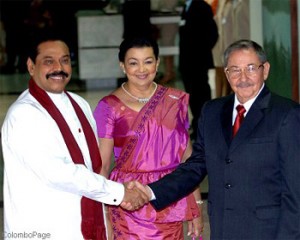Cuba Hosted Sri Lanka Pres/War Criminal
By
Ron Ridenour

Sri Lankan President Mahind Rajapaksa and Cuban President
Raul Castro. File photo from colombopage.com
June 20, 2012
HAVANA TIMES —
“Cuban President Receives Counterpart from Sri Lanka” read the Prensa Latina
headline of June 17. The agency reported that the four-day official visit by
President Mahinda Rajapaksa was at the invitation of President Raul Castro.
Does
this mean that the “honored guest”—widely known to be one of the world’s most
brutal government leaders, responsible for tens of thousands of deaths of the
Tamil people, who is also selling much of his country to foreign multi-nationals
corporations, and whose main export partner is the United States—is made of the
same stuff as his “counterpart”?
“Cuba
is acting immorally and in contradiction to its long-time solidarity with the
oppressed and exploited peoples of the world,” I wrote in “Cuba outvoted at
“UN
Human Rights Council over Sri Lanka-Tamils”. (See also
“Cuba’s
Contradictory Stance on Tamils”)
There
is ample evidence that Sri Lankan governments have long been discriminating
against, oppressing and murdering Tamils. Besides physical violence, the
government has passed laws making Tamils second-class citizens.
They
are denied equal access to education and employment; their religions and
language are not on an equal footing with Sinhalese and their aggressiv version
of Buddhism. My recent book, “Tamil
Nation in Sri Lanka”, outlines this sordid
history.
So,
why is the Cuban government supporting this and the previous Sinhalese
chauvinist governments? Havana Times offers some answers in “Will
Sri Lanka Tamils get justice from the UN?”
The
foreign politics of the Cuban government is based, in large part and
understandably so, on its rancor with the United States for its permanent
intrusion in Cuban affairs as well as that of many other peoples and governments
who do not buckle under its domination.
Recently,
the US has leveled complaints that the Sri Lanka government overstepped its
right to destroy the guerrilla organization Liberation Tigers for Tamil Eelam
(LTTE) by bombing civilians.
Most
of the 47 governments on the Human Rights Council,
including six Latin American governments, agreed.
This
is not to be construed as an offering of applause to the world’s greatest
terrorist state, for the US makes this “human rights” gesture for its own
hypocritical geo-political reasons, which the writing above explains.
Since
the US-UK axis makes an insignificant complaint about this, Cuba’s government,
in a knee jerk fashion, is all the more enthusiastic about being chummy with a
government that systematically eliminates Tamils in a genocidal pattern.
By
so reacting, Cuba has turned its back on its own solidarity principles of
standing beside all oppressed and exploited peoples. (1)
As
a long-time supporter of the Cuban revolution—since my first demonstration,
which took place in April 1961 in front of a US federal building as the Yankees
invaded Cuba at the Bay of Pigs, and through to working for Prensa Latina and
Editorial José Martí in the 1980s-90s, and with hundreds of articles and six
books on Cuba to my credit—I am sickened by the Cuban government’s hypocritical
support of Rajapaksa and his family regime and, consequently, the immoral
acceptance of the genocide against a minority people. I am certain that if Che
Guevara were around he would rant and rave, and that is what I ask all
solidarity supporters of Cuba to do.

